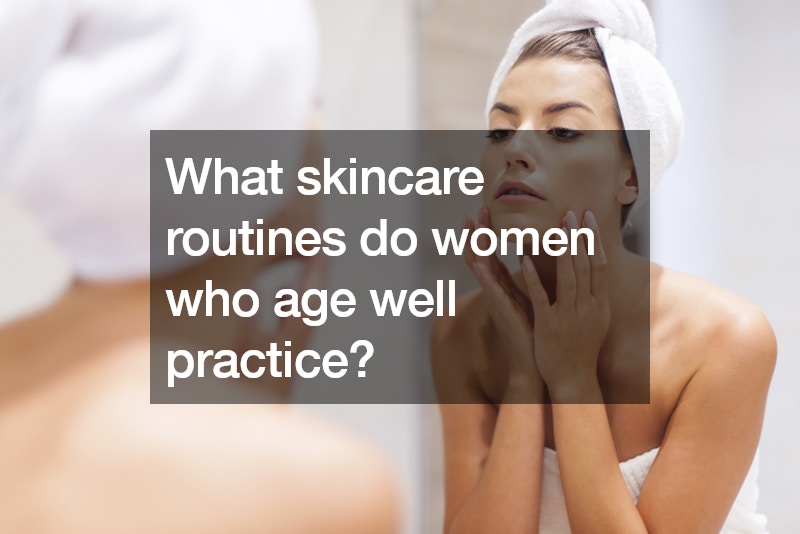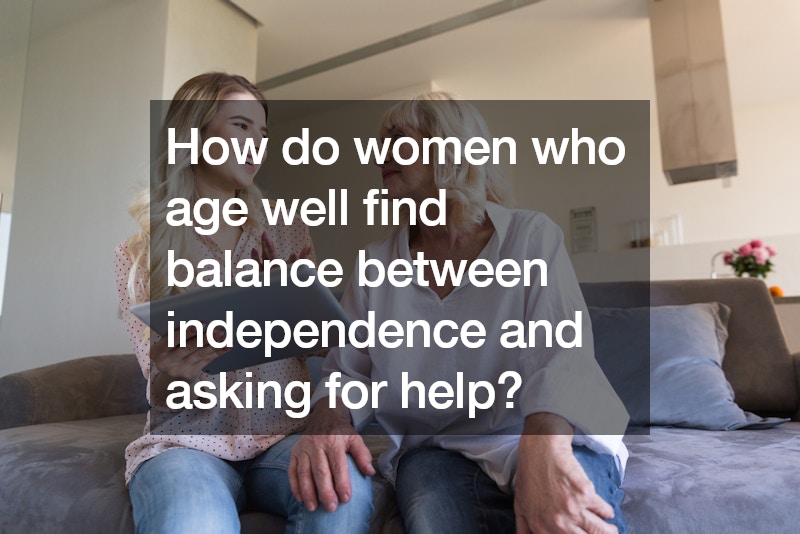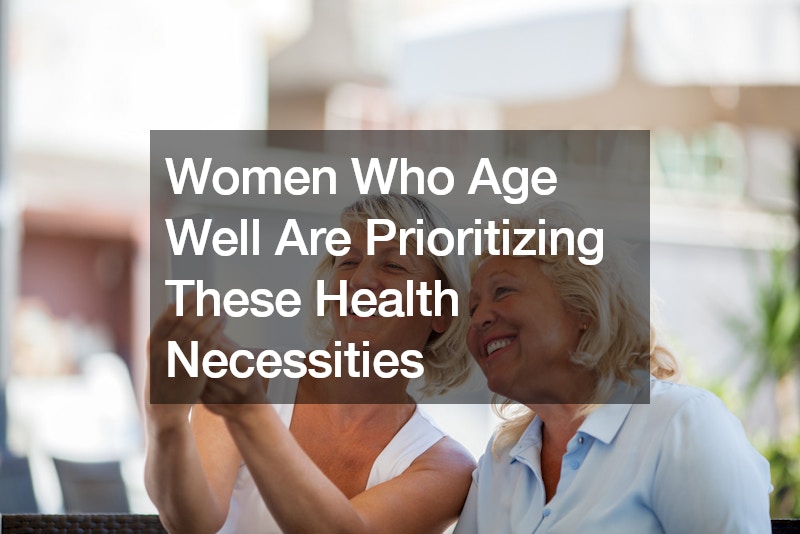Aging is an inevitable part of life, but the approach to this natural process varies significantly among women. Women who age well tend to adopt a holistic lifestyle that prioritizes health, wellness, and self-care. Their choices span dietary habits, physical activity, mental health, and social engagement—all aligning to support graceful aging and vitality.
In a world where the stigma of aging is often negative, women who embrace their age stand out as role models for their resilience and empowerment. They understand that their well-being encompasses not only physical appearance but also emotional and mental health, spiritual fulfillment, and social connections. This article will explore key practices that contribute to health and wellness, highlighting choices that can enhance quality of life.
Through various strategies ranging from seeking services of medical professionals like pharmacists and medical aestheticians to considering physical health zones such as vascular clinics and chiropractic care, women can craft a multidimensional approach to aging well. Let’s dive into the essential elements these women prioritize as they embrace each stage of life.
1. What dietary habits do women who age well follow?
Women who age well often adhere to balanced dietary habits that prioritize nutritional quality over caloric intake. They focus on whole foods, including a variety of fruits, vegetables, lean proteins, and healthy fats, which provide essential nutrients needed for maintaining energy levels and optimal functioning. Furthermore, these women are conscious of their sugar and salt intake, often opting for fresh ingredients rather than processed ones.
Incorporating foods that support overall health, such as fiber-rich grains and omega-3 fatty acids, is another key dietary habit among women who age well. These foods play a significant role in reducing inflammation, supporting brain function, and enhancing heart health. Additionally, women often seek guidance from health experts, including dietitians and medical aestheticians, to create personalized meal plans that cater to their unique needs.
Moreover, hydration remains a crucial aspect of the diets of women who age well. Proper hydration helps maintain skin elasticity and supports vital bodily functions. Many choose to infuse their water with fruits or herbs to make hydration more appealing and are also drawn to herbal teas that offer additional health benefits, such as anti-inflammatory properties.
2. How does physical activity impact aging in women?
Physical activity is undeniably a cornerstone for women who age well, as it significantly affects their physical and mental health. Engaging in regular exercise promotes cardiovascular health, strengthens bones, and helps maintain a healthy body weight. Many women incorporate a mix of aerobic exercises, strength training, and flexibility routines into their weekly schedules, ensuring a holistic approach to fitness.
For women who age well, staying active also includes exploring alternatives like yoga and tai chi, which foster not only physical well-being but also mental tranquility and balance. These practices enhance flexibility, promote stress relief, and encourage a mindful approach to aging. Regular sessions can be complemented by visits to a chiropractic care specialist, offering additional support for any existing musculoskeletal concerns.
Furthermore, community involvement in physical activities, such as group exercise classes or walking clubs, provides an opportunity for social interaction which is vital for mental well-being. Women often turn to their local rehabilitation therapies centers or wellness facilities for programs designed specifically for age-related fitness. Engaging in supportive group settings contributes significantly to motivation and creates camaraderie, further enriching their lives.

3. What role does mental health play for women who age well?
Mental health is a critical component of overall wellness for women who age well, heavily influencing their quality of life. These women prioritize practices that support mental resilience, such as mindfulness, meditation, and journaling. Such activities foster emotional balance, lower stress levels, and promote a positive outlook on aging.
Additionally, women who age well recognize the importance of seeking professional help when needed. They are not hesitant to reach out to mental health professionals, including therapists and counselors, for support during challenging times. In the same regard, socializing with friends and family provides emotional support, affirming the idea that connection is integral to mental health.
Women who age well also engage in lifelong learning endeavors to stimulate their minds. This can involve taking classes, participating in workshops, or simply reading about new topics. Keeping the brain active is shown to counter cognitive decline, making these women more adaptable and equipped to handle the challenges of aging.
4. How important is sleep for women who age well?
Sleep is a fundamental pillar of health that women who age well prioritize diligently. Adequate sleep not only rejuvenates the body but also enhances mental clarity, mood regulation, and physical health. It is often recommended that adults aim for 7 to 9 hours of quality sleep each night to ensure restorative benefits.
Women who age well establish sacred nighttime rituals to promote better sleep hygiene, such as reducing screen time before bed and creating a tranquil environment conducive to rest. Many practice relaxation techniques like reading or gentle stretches to unwind after a long day. Furthermore, they may consult with healthcare professionals such as pharmacists to explore safe sleep aids or supplements if sleep challenges arise.
Sleep disturbances can be impacted by various factors, including hormonal changes associated with aging, such as those related to uterine fibroids. Thus, knowledge about these health issues allows women to take proactive measures, leading to informed conversations with their healthcare providers. This strategy not only enhances sleep quality but also contributes to thriving health overall.

5. What skincare routines do women who age well practice?
A comprehensive skincare routine is essential for women who age well, as it directly influences skin health and appearance. Many women invest in high-quality skincare products that cater to their specific skin types, focusing on ingredients that combat the signs of aging. Regular use of moisturizers, sunscreens, and serums containing antioxidants or retinoids helps to maintain skin elasticity and prevent damage from environmental stressors.
Moreover, women who age well often seek professional treatments from medical aestheticians, allowing for customized skincare regimens and procedures. These professionals can provide advanced treatments like chemical peels and microdermabrasion that enhance skin texture and radiance. Regular consultations ensure that skincare strategies are effective and tailored to the evolving needs of their skin.
In addition to topical treatments, a healthy diet rich in vitamins and antioxidants plays a significant role in skincare. Women who age well emphasize their hydration, nutrition, and lifestyle choices to enhance their skin health from the inside out. They understand the connection between general wellness and skin appearance, consistently fueling their bodies with nutrient-dense foods that promote a glowing complexion.
6. How do women who age well manage their health care needs?
Efficient management of health care needs is paramount for women who age well, as they often face various age-related health concerns. Staying organized with medical appointments, medications, and health screenings ensures proactive care. Many women keep regular appointments with specialists, such as pharmacists for medication management, oral surgeons, or vascular clinics for preventive care assessments.
Women also prioritize open communication with their healthcare providers, discussing concerns regarding conditions like uterine fibroids or the potential for diabetic strip sales if they manage diabetes. This transparency allows for collaborative care strategies that ensure their health needs are adequately met. Regular check-ups not only catch potential issues early but also build trusting relationships with medical professionals who support their journey.
For holistic health management, women often integrate complementary therapies into their routines, including chiropractic care and rehabilitation therapies. This multilateral approach to health care supports physical and mental wellness, allowing them to engage more fully in life. Creating a supportive health care team including various specialists ensures they remain informed and empowered about their health.
7. What role does social engagement play in aging well for women?
Social engagement is a vital aspect of aging well, as it profoundly impacts emotional and mental health for women. Maintaining social connections can significantly reduce loneliness and foster a sense of belonging. Women who age well actively seek social interactions through clubs, volunteering, or local community groups, building a web of support and camaraderie.
Interaction with others provides stimulation and enrichment, aligning with women who are committed to lifelong learning. Many choose to participate in shared activities that ignite their passions, such as book clubs or art classes, fostering new friendships while expanding their horizons. Social gatherings not only invite fun but also encourage open conversations about health challenges, providing a platform to share experiences and solutions, including consultations with female hair loss specialists.
Additionally, for those considering assisted living options, understanding the importance of continued social engagement in these communities is essential. Women who age well recognize that thriving social environments can enhance their quality of life, even in assisted living settings. Proactive approaches to maintaining connections allow for continued growth and fulfillment throughout the aging journey.

8. How do women who age well incorporate learning and mental challenges?
Lifelong learning is a core principle for women who age well, keeping their minds active and engaged. They often seek out new educational experiences, whether through online courses, workshops, or community classes tailored to their interests. This constant pursuit of knowledge helps to stave off cognitive decline and provides opportunities for personal growth.
Incorporating mental challenges into daily routines can manifest in various ways. Activities like puzzles, strategic games, and even learning new languages serve as effective cognitive workouts. Many women also engage in community-focused initiatives that encourage collaboration and problem-solving, further enhancing their social connectedness while stimulating their cognitive functions.
Furthermore, technology has opened avenues for women to access learning materials and platforms from the comfort of their homes. Courses in digital literacy or training sessions on apps can empower them to embrace the digital world, broadening their horizons. This adaptability to new skills not only enriches their lives but also inspires others in their communities.
9. What are the financial considerations for women who age well?
Effective financial planning is a crucial aspect for women who age well, helping to ensure security and independence as they navigate their later years. Understanding expenses related to health care services, including costs associated with assisted living, medication, and regular check-ups, is integral for maintaining peace of mind. Women who age well are often proactive in consulting financial advisors to create comprehensive plans tailored to their unique situations.
Investing in preventive health measures can yield significant long-term savings; thus, many women prioritize spending on health-promoting services such as dental care from oral surgeons and routine visits to vascular clinics. Additionally, some women focus on securing supplemental insurance that addresses specialized needs such as diabetic strip sales or rehabilitation therapies. Financial literacy empowers these women to make informed decisions about their care without the stress of financial burden.
Moreover, women who age well often foster discussions about financial health within their families, ensuring that future generations recognize the importance of planning. They tend to enroll in workshops or community events focusing on financial literacy, thus continuing the cycle of education. Financial preparedness directly supports their ability to maintain independence and engage in fulfilling activities throughout their lives.

10. How do women who age well find balance between independence and asking for help?
Finding the balance between independence and seeking help is an essential skill for women who age well. They often take pride in their abilities and strive to maintain autonomy, while also acknowledging when to reach out for support. This balanced approach is key to enhancing their overall well-being, as it encourages personal agency without compromising safety or health.
Women who age well typically develop strong support networks that allow them to share responsibilities, ensuring they do not hesitate to ask for assistance when necessary. This may involve turning to family, friends, or community services for help with errands, health-related appointments, or daily activities. Acknowledging the importance of these connections fosters deeper relationships and ensures they maintain the quality of life they desire.
Moreover, women often participate in peer support groups or programs, where they can openly discuss the challenges of aging and share resources to navigate these transitions. By learning from one another’s triumphs and struggles, they fortify their resilience and expand their support systems. As a result, they cultivate an approach to aging that simultaneously values independence and communal care.
Conclusion
The path to aging well is intricately woven through choices made in various aspects of life. Women who commit to prioritizing health necessities—spanning nutrition, physical activity, mental health, skincare, and healthcare management—usher in a new paradigm of aging that defies stereotypes. Through the integration of education and engagement with their communities, these women serve as inspirational role models for future generations.
As we celebrate the journey of women who age well, it’s crucial to recognize that aging is not merely a passage of time, but a vibrant phase of life rich with opportunities for growth and joy. By embracing effective practices and seeking out necessary support, women can redefine the narrative surrounding aging and inspire those around them to live with purpose and passion.

